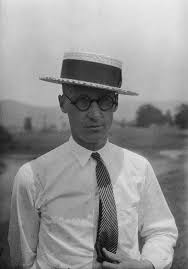John Scopes, Local Hero

March 4, 2017
The beginning of the twentieth century was one of the most progressive eras in all of human history. The world changed socially, technologically, and economically. When we as students think about the 1920s, we typically think of the “Roaring 20s”: Gatsby-style parties, flappers, jazz music, that sort of thing. All the changes that came about, though, were challenged in some way or another.
Science was one field that saw numerous advances in the 1920s. In some places, it was illegal to teach students the still-controversial topic of evolution as opposed to creationism. Specifically, the Butler Act of Tennessee was the law that banned the teaching of evolution in that particular state. In 1925, in the quiet town of Dayton, however, 25-year-old John Scopes broke the law, and what ensued was one of the most influential trials to influence public education ever.
It was called the Scopes Monkey Trial. Famed defense lawyer Clarence Darrow represented Scopes, and the prosecution was led by William Jennings Bryan, best-known for being Secretary of State under President Woodrow Wilson. The trial, however, represented so much more than a substitute teacher breaking a law. It represented the battle versus modernism and fundamentalism, which was the prevailing conflict of the era. Modernists wanted society to move forward; they believed in civil and women’s rights, were anti-Prohibition, and yes, believed that evolution should be taught. Fundamentalists, on the other hand, believed in literal interpretation of the Bible, and therefore claimed there was no room for evolution to be believed in.
Scopes lost the trial and was fined $100, but modernists still took it as a victory because of the publicity that came with the high-profile trial. The fine was overturned on a technicality, the Butler Act was repealed in 1967, and Scopes lived a long, fulfilling life until he died at the age of seventy, after which he was buried in his hometown of Paducah, Kentucky.
John Scopes paved the way for both the modernist movement and the improvement of public education, so it’s a pretty big deal that he’s from and buried in Paducah. Today, both evolution and creationism are presented side-by-side in schools as equally feasible theories as to how our species came to be. Without the Scopes Monkey Trial, though, that may never have been possible. He may have made his name in Dayton, Tennessee, but Paducah can claim the hero that is John Scopes.
Visiting his grave could be a great activity for Paducah history buffs, or someone who is just bored on a weekend with nothing else to do. He’s buried in Oak Grove Cemetery. Signs are scattered around Paducah noting historical events or areas, and there’s one in front of the front gates of the cemetery, giving a summary of the trial. While it’s interesting to go see such a historical person’s grave, it’s always necessary to remain respectful of someone’s memory. Progress is a great thing, but most people don’t know that one of the most progressive events in education history has roots in our town. Let’s change that.











